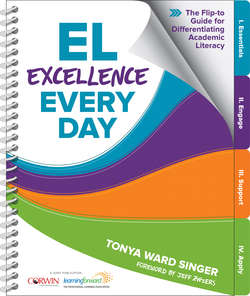Читать книгу EL Excellence Every Day - Tonya Ward Singer - Страница 20
На сайте Литреса книга снята с продажи.
Core Pedagogy for EL Excellence
ОглавлениеSix essential verbs shape the core pedagogy and organization of this book. The six foundational mindsets and actions are as follows:
1 VALUE: Relationships are at the heart of effective teaching. Effective teachers of ELs foster relationships with ELs based on mutual respect. One way to value ELs is to see students’ multilingualism as an asset, not a problem. We value ELs when we recognize that different cultures, languages, and experiences are not inferior to our own and when we are interested in learning the diverse assets each student brings to school.
2 EXPECT: Students rise (or fall) to the level of a teacher’s expectations. Low expectations for ELs and students of color are a reality we must be proactive to address. We make high expectations a reality when we value ELs, have clear success criteria, and use supports strategically to help ELs thrive with high-level learning.
3 ENGAGE: No matter how dynamic our lessons, if ELs are in sit-and-get mode, they will not deeply learn content or academic language. Effective teachers use a variety of strategies in every lesson to actively engage ELs and all students including relevance, peer conversations, and actions (e.g., movement, annotation, and writing).
4 OBSERVE: As we engage students, we observe what they do and listen to what they say to learn more about their thinking, strengths and challenges with our content, and language goals. We use every task as an opportunity to gather formative data. When students are silent, unengaged, or struggling, we reflect to change our approach. When students thrive, we notice their strengths and build on them in subsequent lessons.
5 SUPPORT: Effective teachers use supports strategically to engage and challenge ELs. Being strategic is essential and requires paying close attention to students to notice the strengths and challenges they bring to each task. Using real-time data to choose or lose scaffolds is at the heart of effective teaching with ELs.
6 REFLECT: Effective teachers own their impact and continuously reflect to refine how they teach so that all students succeed. Owning impact is the most important mindset for equity and means that when a student struggles, a teacher reflects, “What will I change about my instruction to ensure this student succeeds?”
Using these verbs in synthesis is important, as together they shape the continuous process of teaching for impact. Figure 1.2 represents the mindsets and reflective teaching cycle that are essential to ensure everyday excellence for ELs—and all students.
Using this cycle, effective teachers continuously reflect on the following questions:
EXPECT: What are my goals for student learning?
ENGAGE: How will students demonstrate success?
OBSERVE: What can students now understand and do related to my goals?
SUPPORT: What instruction and scaffolds will I provide to ensure student success?
REFLECT: How did my instruction impact student learning? How will I adapt my approach to ensure every learner thrives?
The verb value is not a separate step but the ever-present climate we create by valuing all students in our classroom for the assets they bring including their home language(s), cultural backgrounds, and unique experiences. See Chapter 2 for specific actions to create a climate in which every EL feels valued as a scholar capable of excellence. Creating such a climate is as important to learning as oxygen is to breathing. Without it, any instructional approach you use will likely fail.
Figure 1.2 Essentials for EL Excellence Every Day
